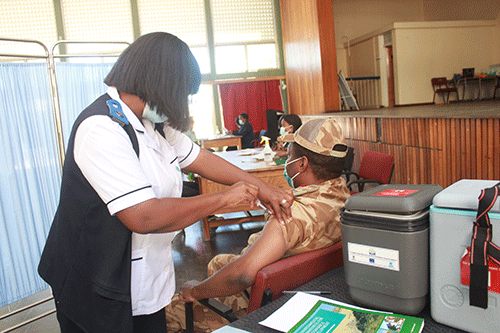The government is being dragged to court for allegedly refusing to provide information on the safety and possible adverse effects of the Covid-19 vaccinations administered during the pandemic.
The Health Defence League (HDL), which represents 537 people, along with members of the public Monika Ruppel, Manfred Jochen Förtsch, Werner Gertz and Paul du Plessis, want the High Court to direct the government, President, health ministry, education ministry, Attorney General and the Namibia Medicines Regulatory Council to provide their source of information and the information itself on which they relied when they informed the public that the Covid-19 vaccines were safe and effective for people with chronic illnesses, and would help prevent serious illness, hospitalisation and death
from Covid-19 infections.
The group further wants the court to declare that the government’s decision to permit Covid-19 vaccine Pfizer/BioNTech to be administered to the public while it was not registered in terms of the Medicines and Related Substances Control Act, was unlawful.
Furthermore, the court is asked to declare null and void any indemnification forms
that the group might have signed before getting vaccinated.
Making oral submissions before Deputy Judge President Hosea Angula yesterday, the group’s lawyer advocate
Raymond Heathcote said the suit is not about whether vaccination is good or bad, but about the right to receive information to make informed choices, and the government’s duty to make such information available to the public.
“The source of the right to the information sought does not only lie in Article 18 of the Constitution, as so incorrectly and opportunistically assumed by the respondents, but in a range of other identified and pleaded Articles of the Namibian Constitution, as well as a number of pertinently pleaded international obligations binding on the Namibian State,” he submitted.
Heathcote went on to say, “All that the respondents [the government] are required to do, is to provide information about all possible side-effects. This type of information cannot possibly contain trade secrets. A side-effect of a vaccine is not and can never constitute a trade secret”.
On the opposing end, the Government’s lawyer Tinashe Chibwana said none of the 537 individuals represented by HDL signed the indemnity form, and are therefore not aggrieved, and thus they have not earned the right to the relief they seek, information disclosure.
He went on to say that the group failed to join the vaccine manufacturer in the suit, as they needed to be heard for the court to “determine whether their trade secrets should be disclosed”.
“We further submit that the
applicants themselves state that the information has not been divulged by the vaccine manufacturers. In the circumstances and relying on the assertions made under oath by the applicants, it follows that the information constitutes trade secrets of the vaccine manufacturers, and is confidential,” argued Chibwana.
He further stated that the government has a fiduciary duty as a recipient of information imparted and received in confidence not to disclose such information, unless they are permitted by the vaccine manufacturers.
According to Chibwana, the alleged right to information, in any event, does not exist in “our law”.
“The applicants seek to assert a right to information for the purposes of making informed decisions as to whether or not they will sign the alleged indemnity forms before they are vaccinated. We submit that the underlying rationale by the applicants is the inaccurate factual view dispelled under oath by the respondents that the ‘Namibian government seeks to indemnify itself in the consent form’,” he submitted.
In court documents, health minister Kalumbi Shangula said the group intends to give rise to a debate on the efficacy of Covid-19 vaccines, which goes far beyond the Namibian borders.
The suit also seeks to challenge the government’s policy on the administration of Covid-19 vaccines, he said.
The minister added that all the information requested by the group is readily available publicly, and some has been published by the World Health Organisation and the ministry in notices.
“I must also indicate that some of the information sought related to information provided to the Registrar of Medicines by the manufacturer to determine whether or not to grant an exemption, etcetera, and such information includes trade secrets of the manufacturer,” said the minister.
Shangula explained that during the outbreak, Namibia, together with the world, was dealing with a virus that no one had an idea how to treat at the time.
“At the time, the aim was to prevent infections as much as possible, whilst the world was researching for an effective treatment for the virus,” he said.
The minister observed that the approach to vaccination selection in Namibia was founded on the principle of evidence-based medicine, putting in place stringent guidance for the evaluation of data emerging from clinical trials in support of issuing vaccine-specific recommendations.
The court will deliver judgement on 4 June.
-mamakali@nepc.com.na



